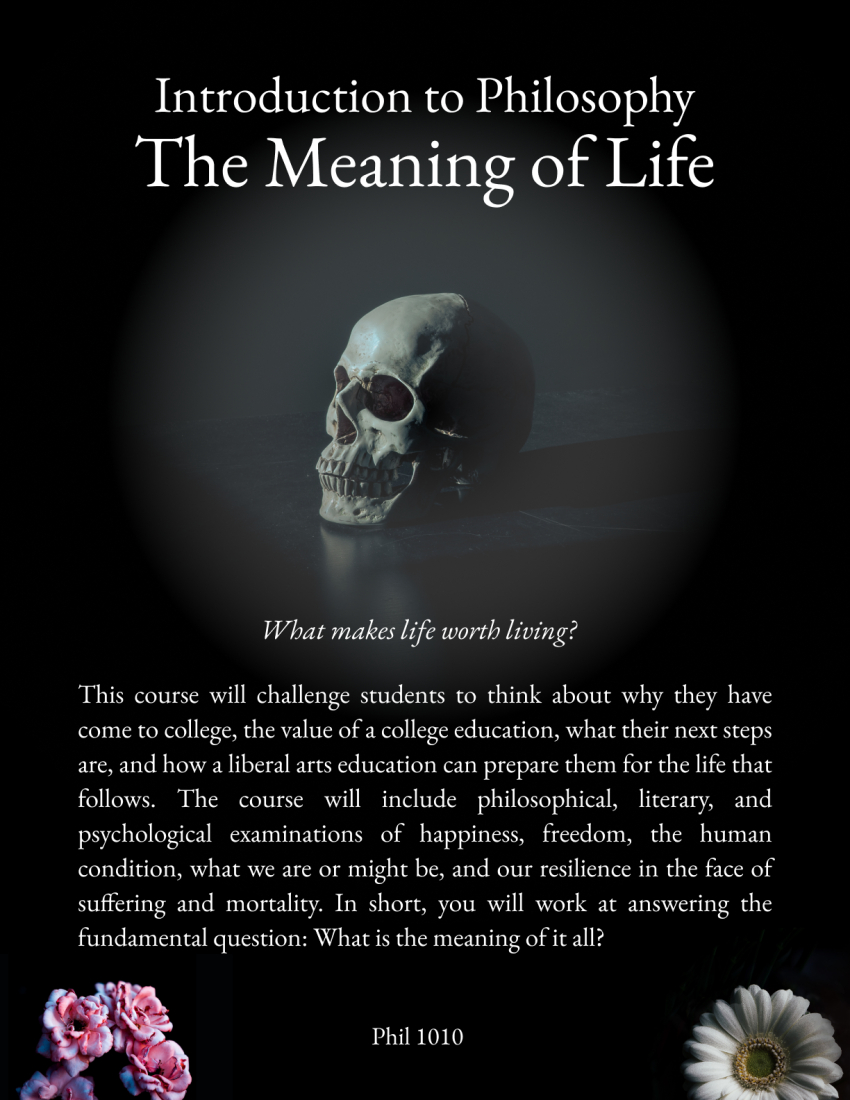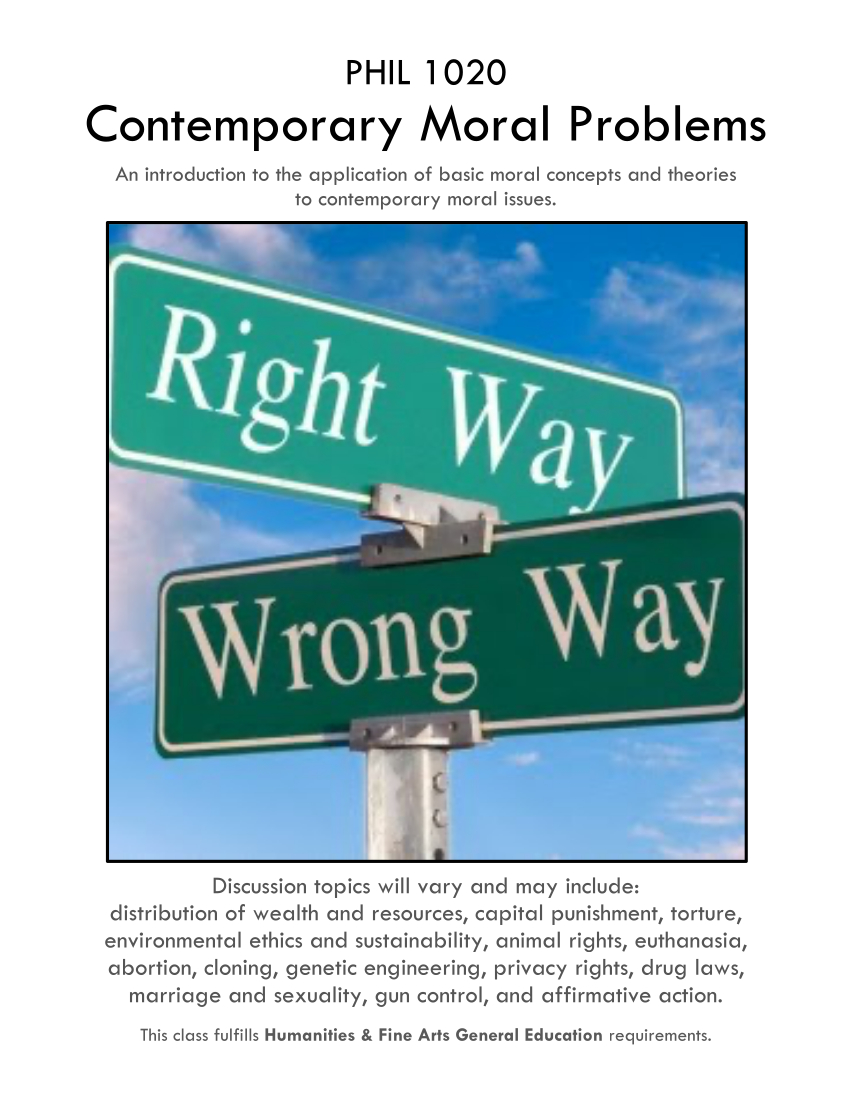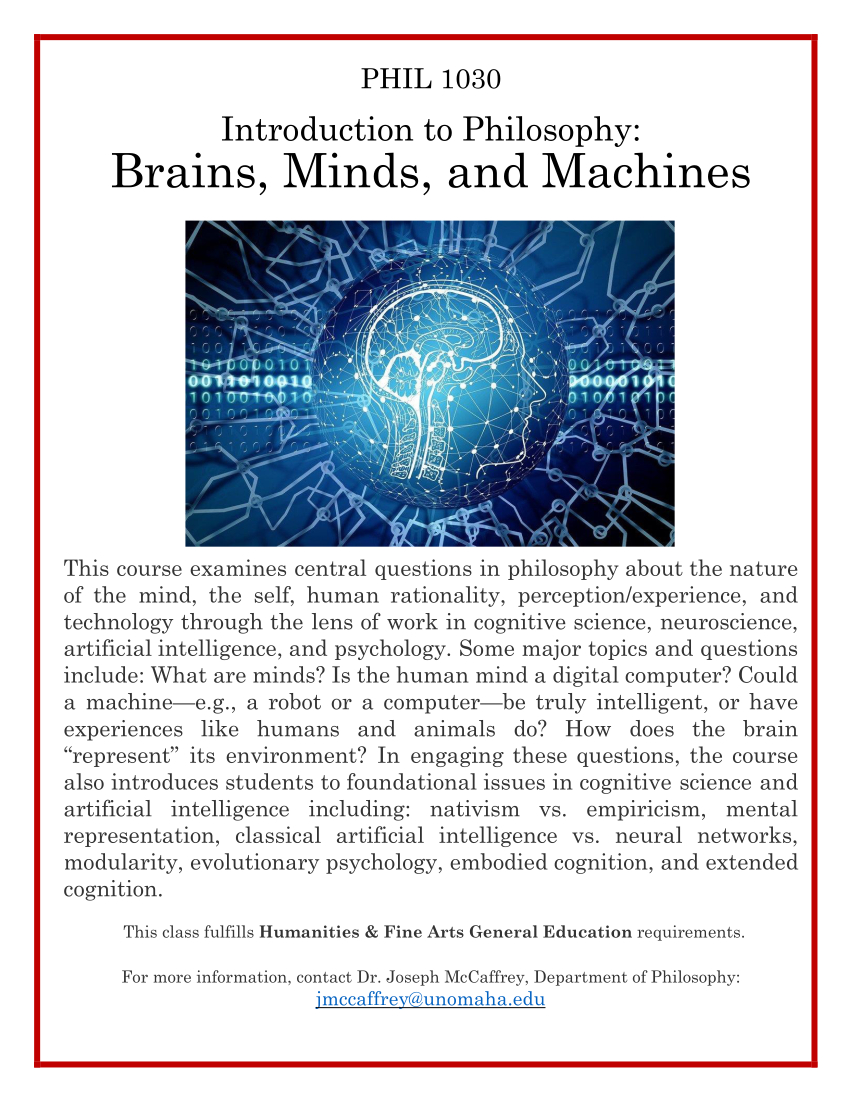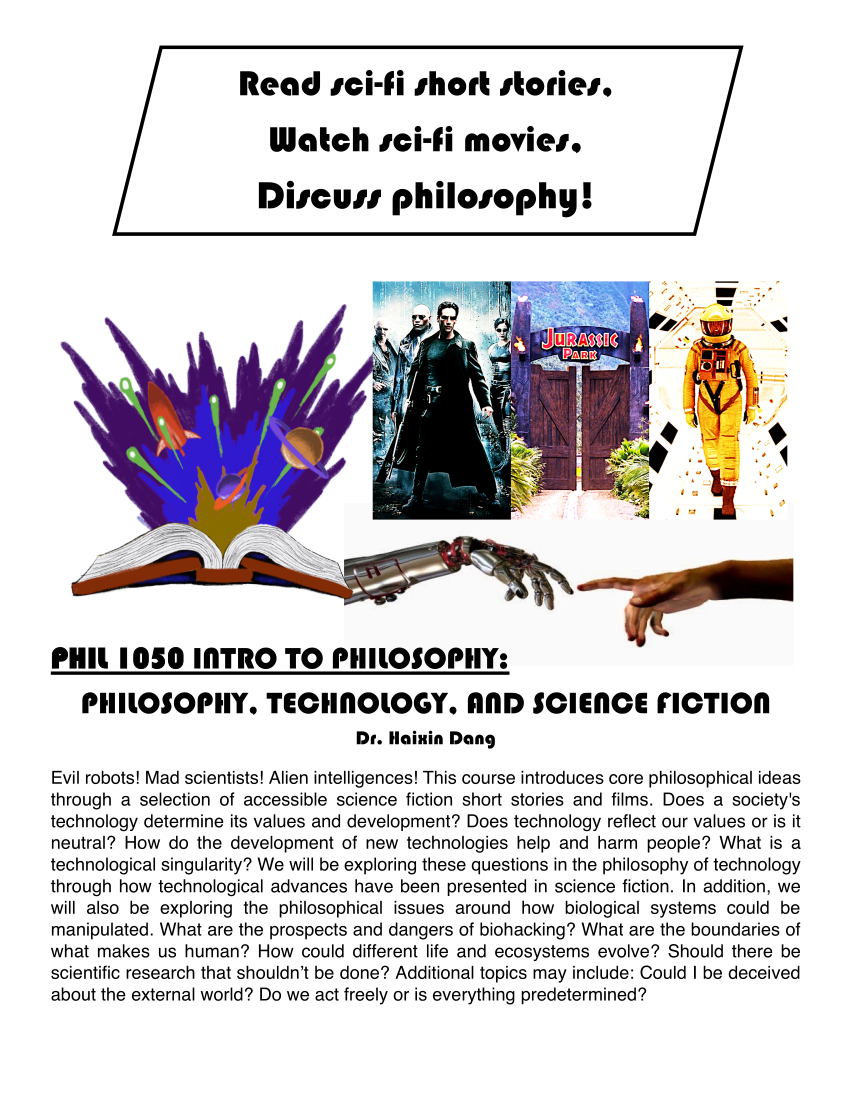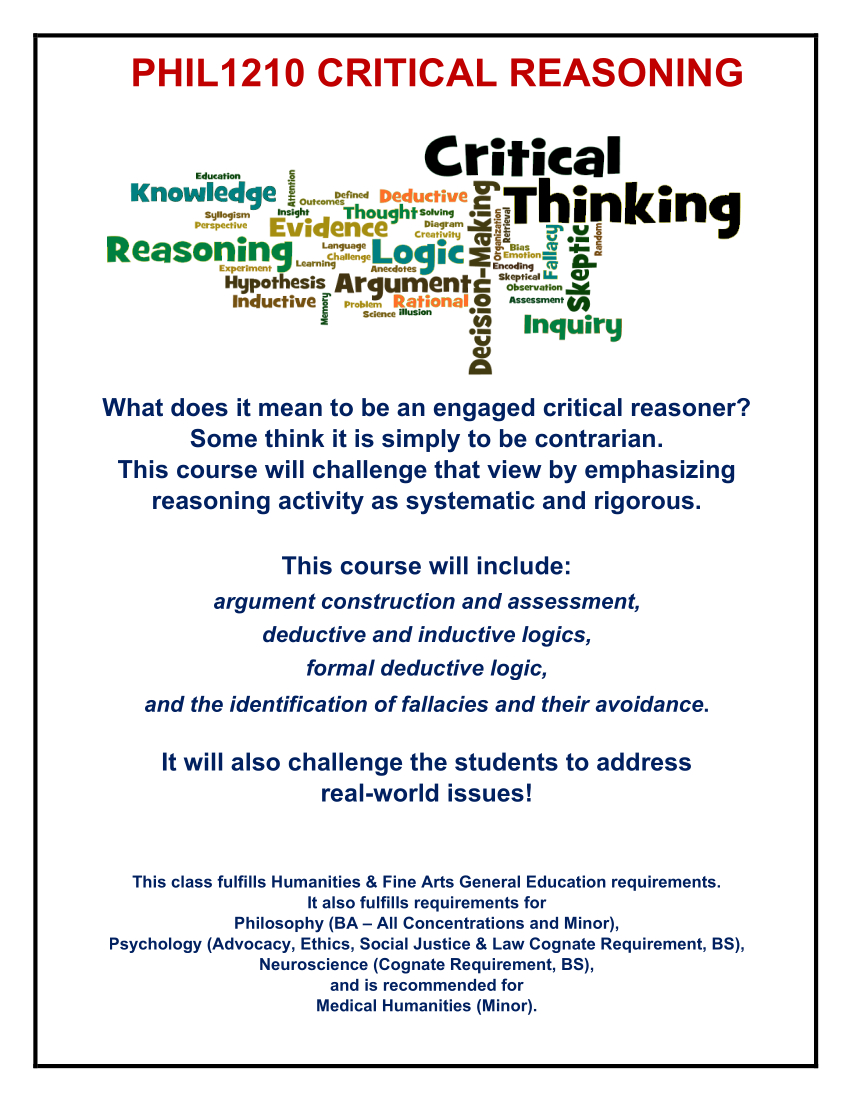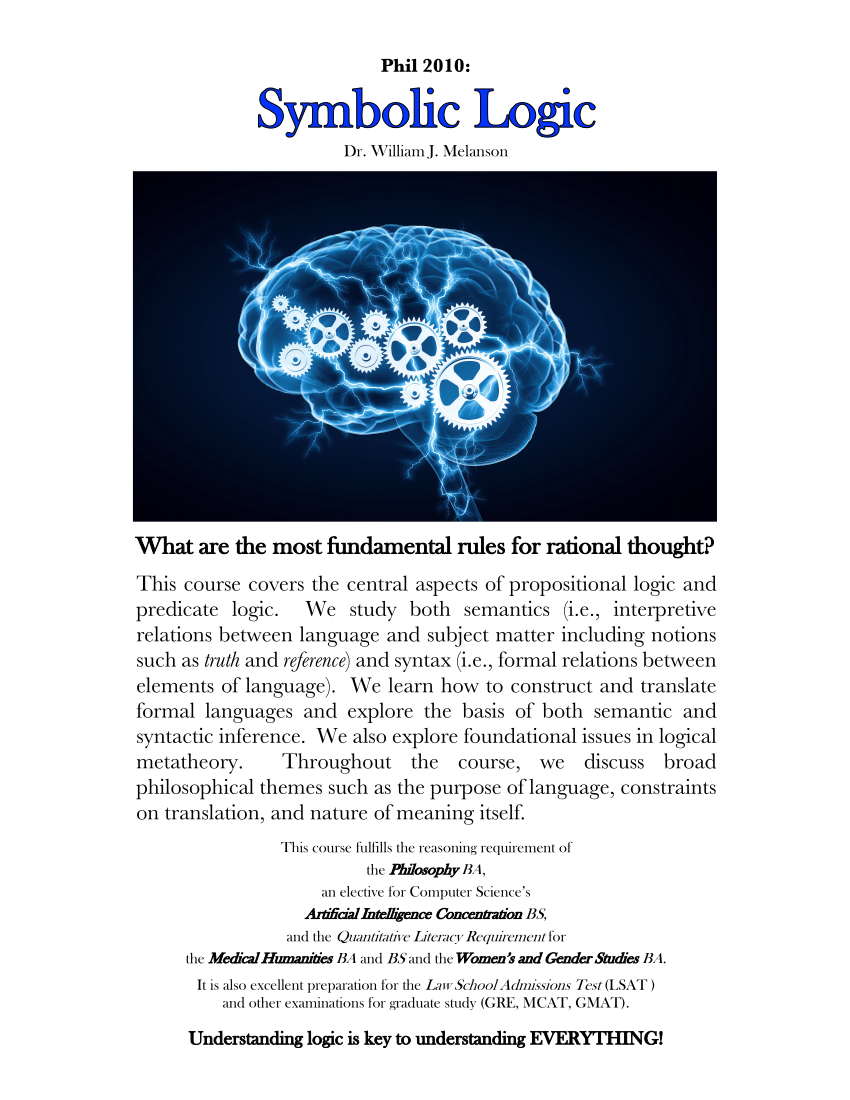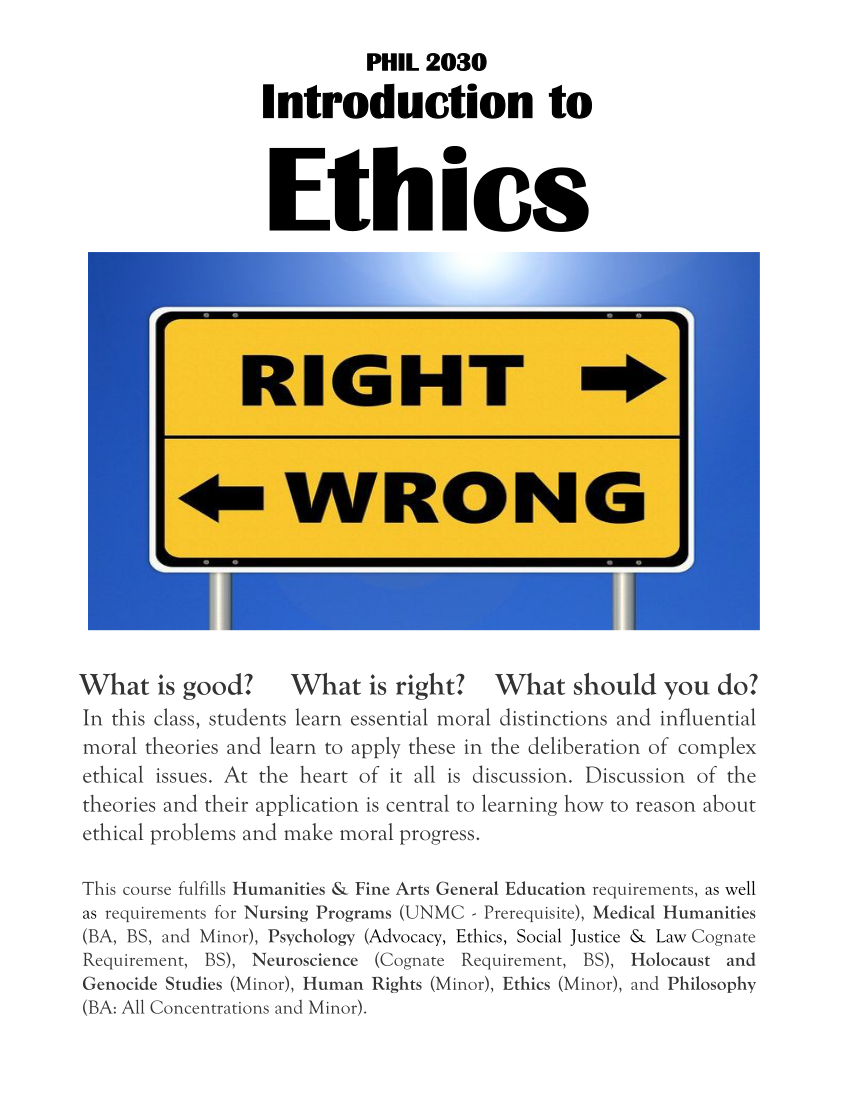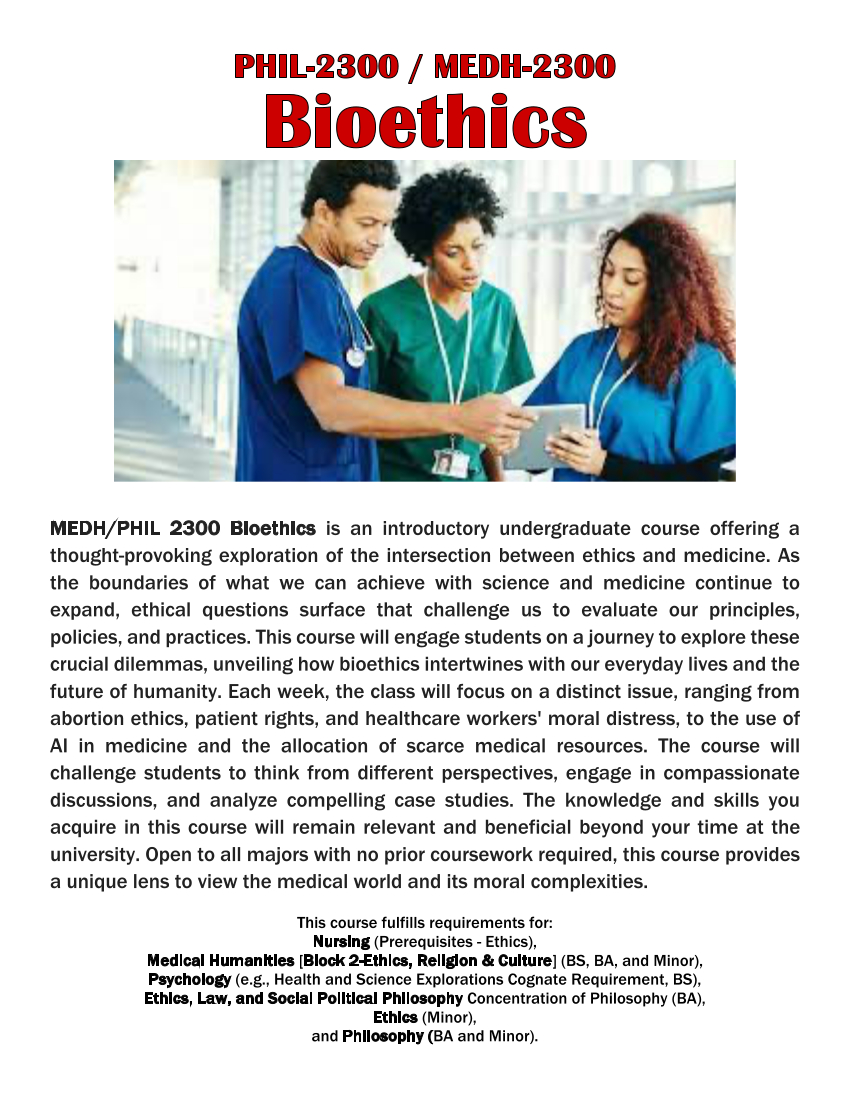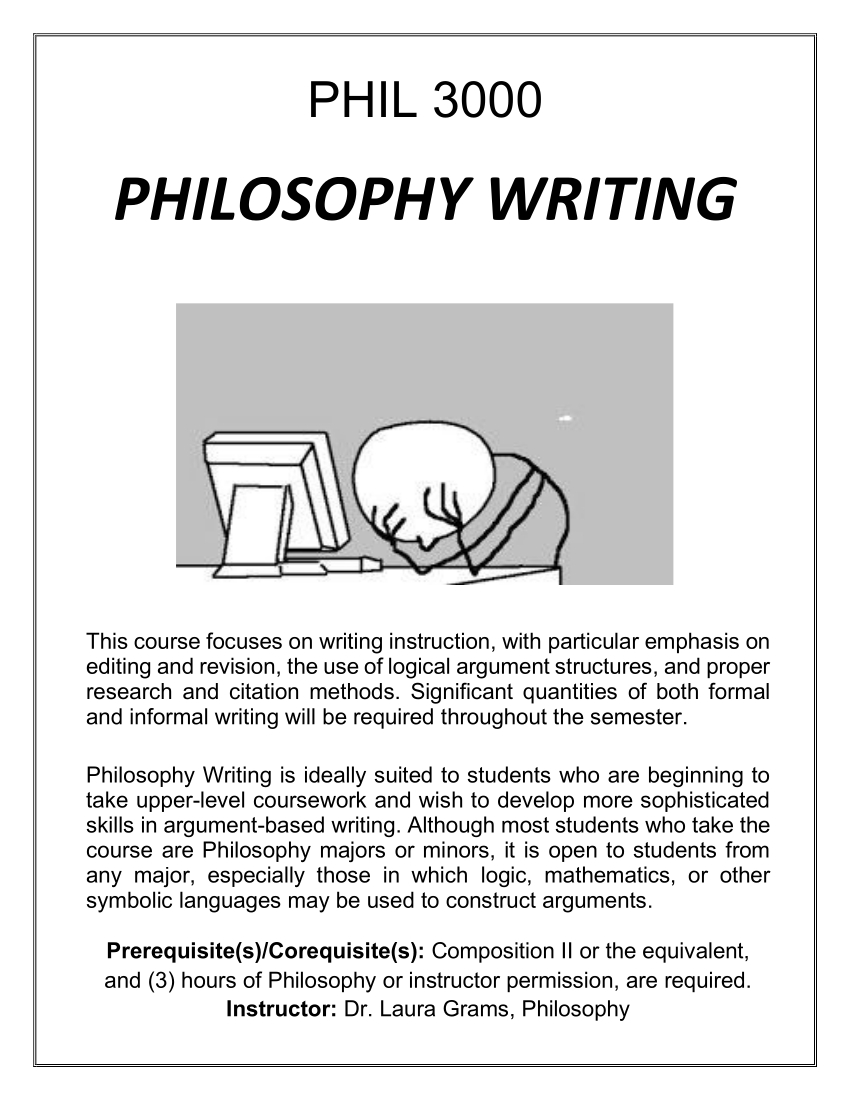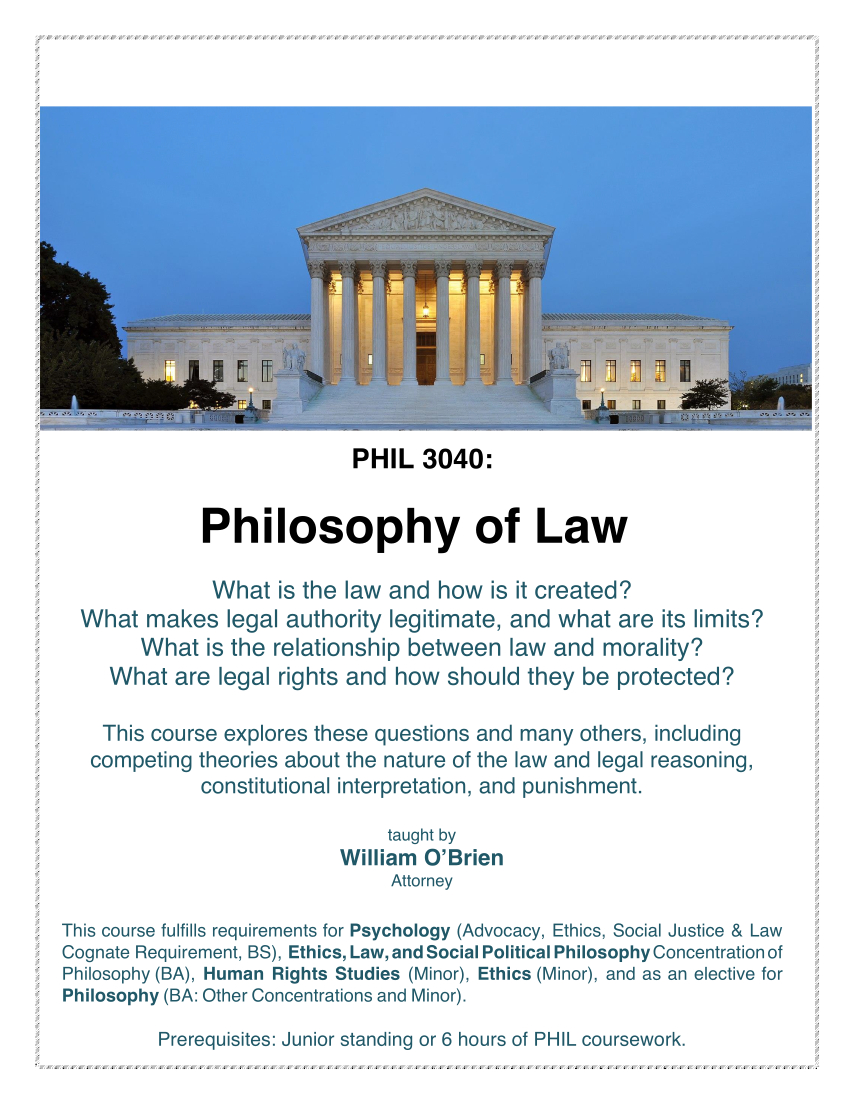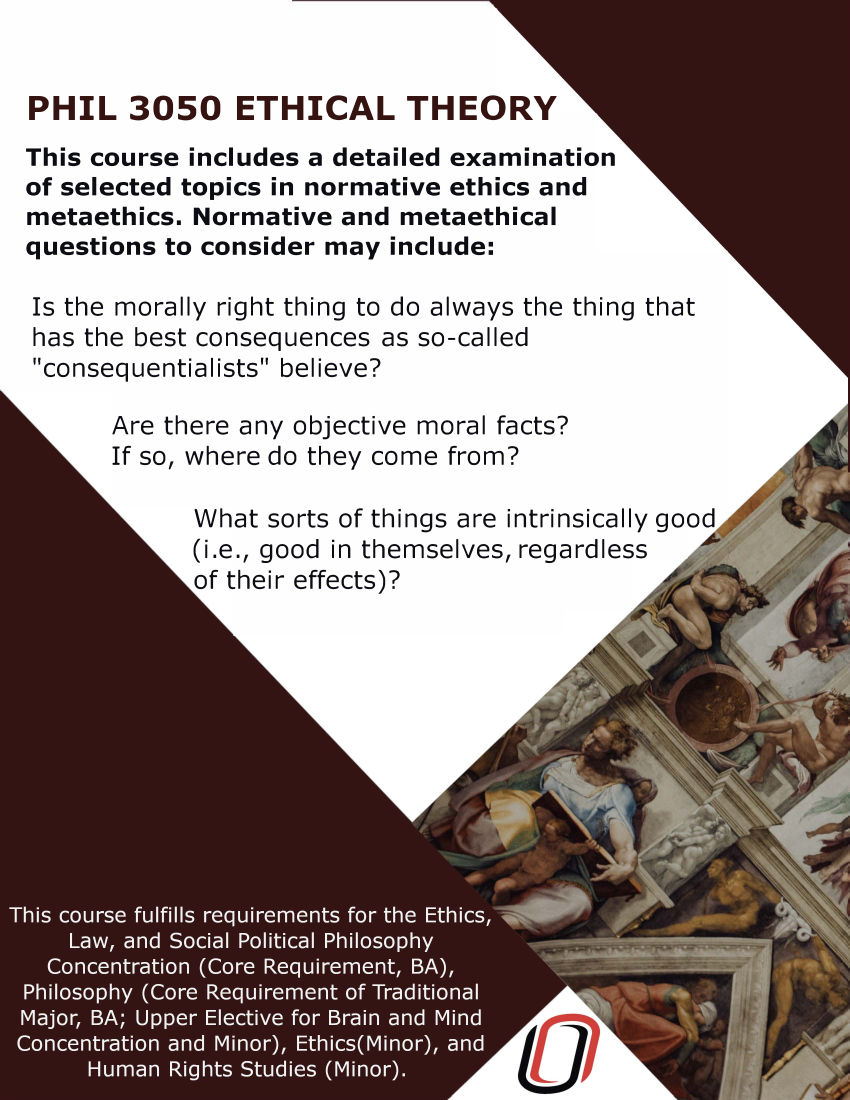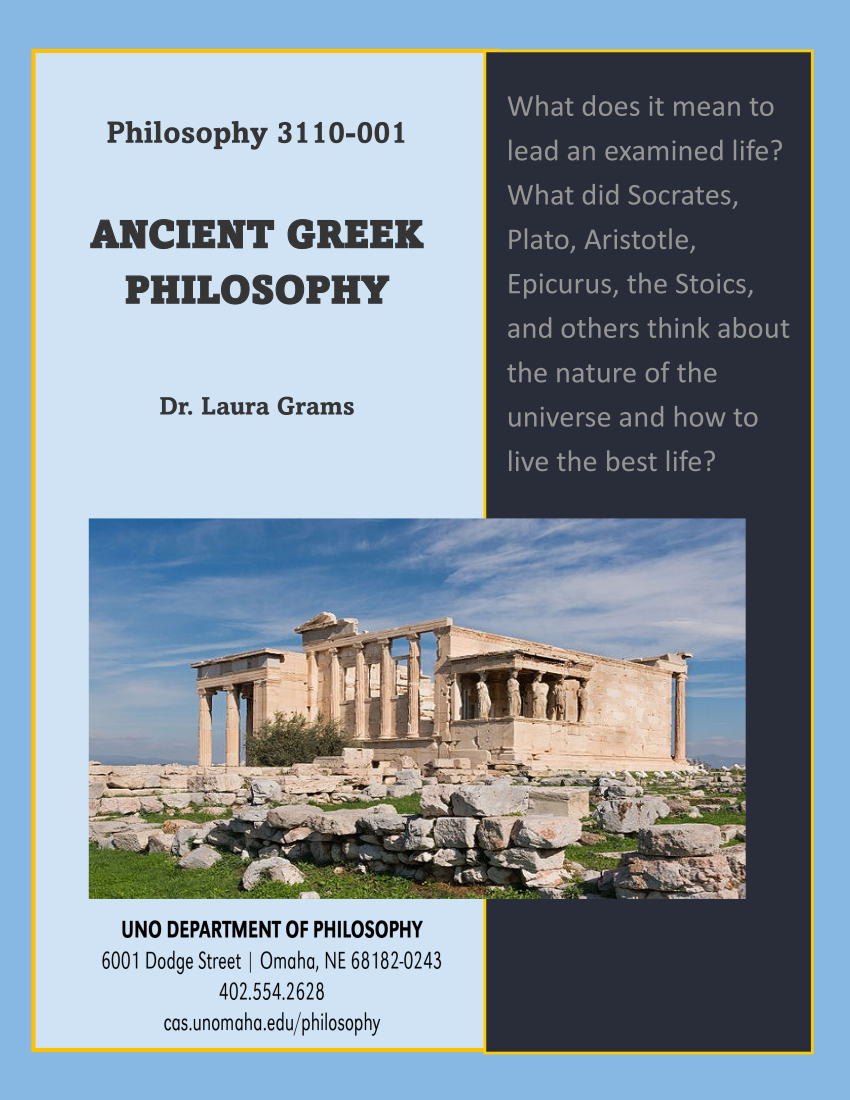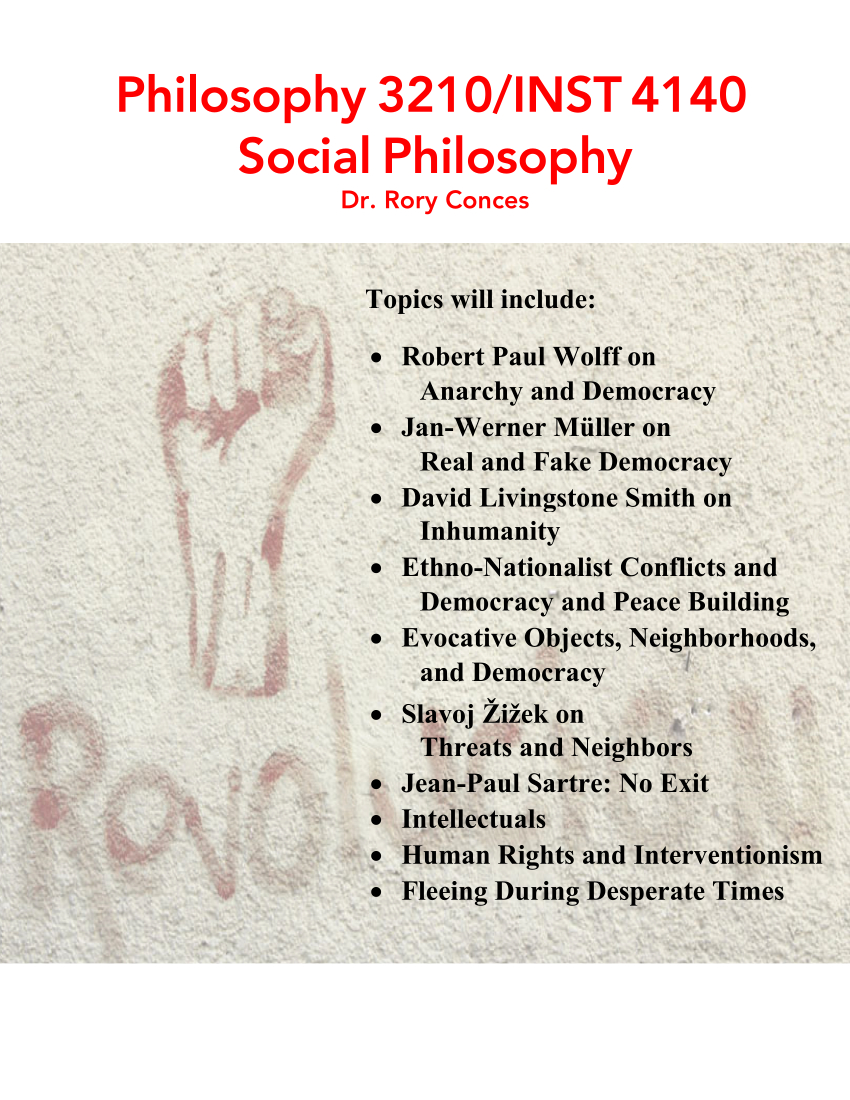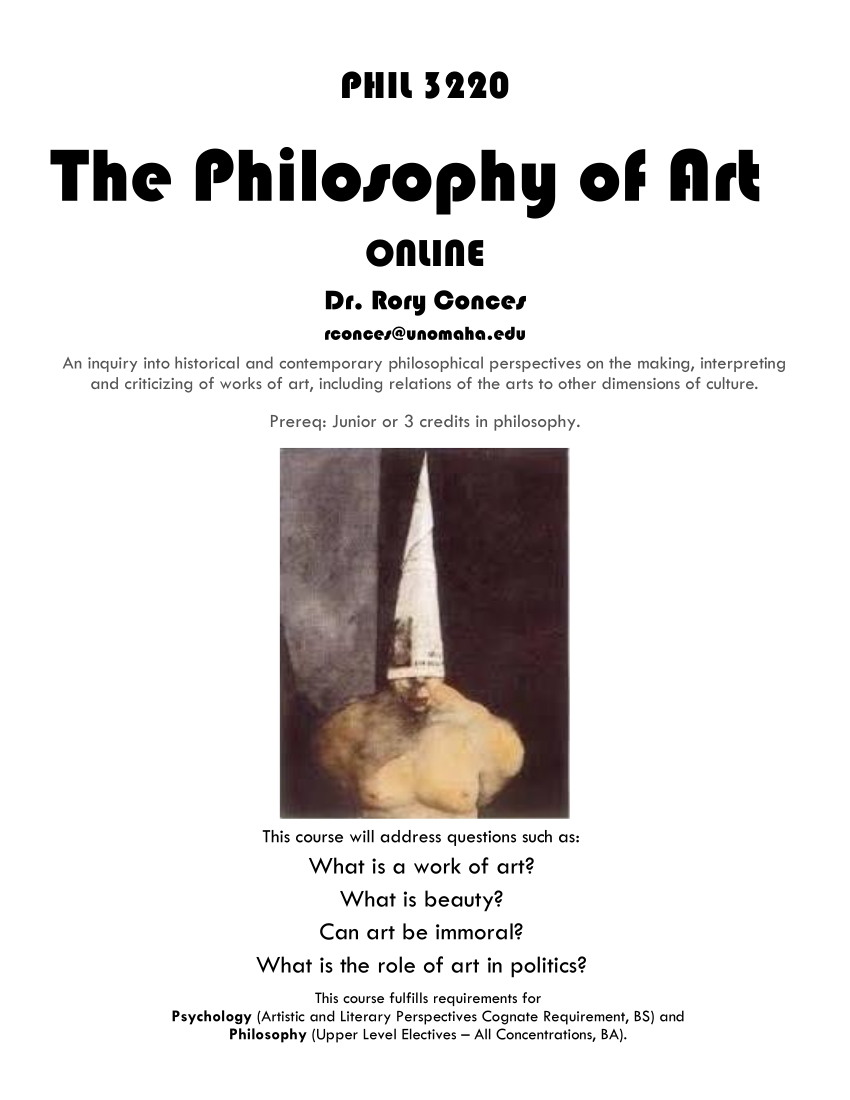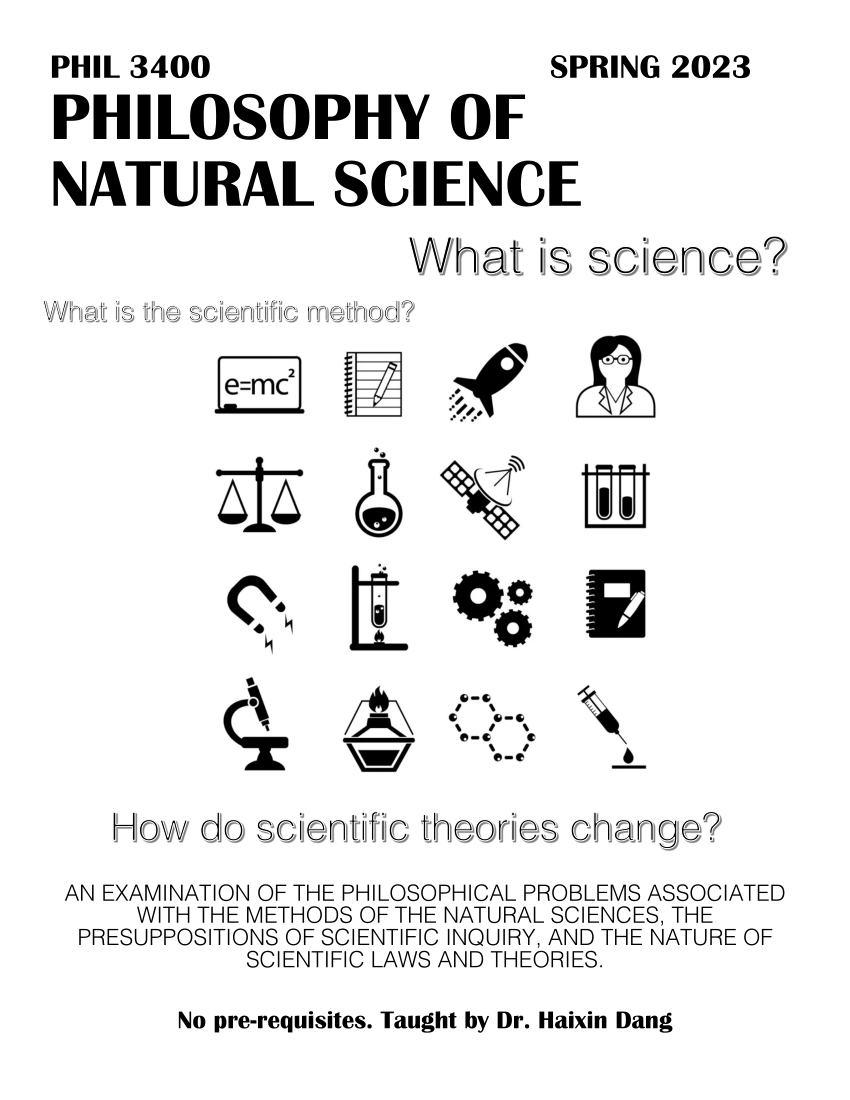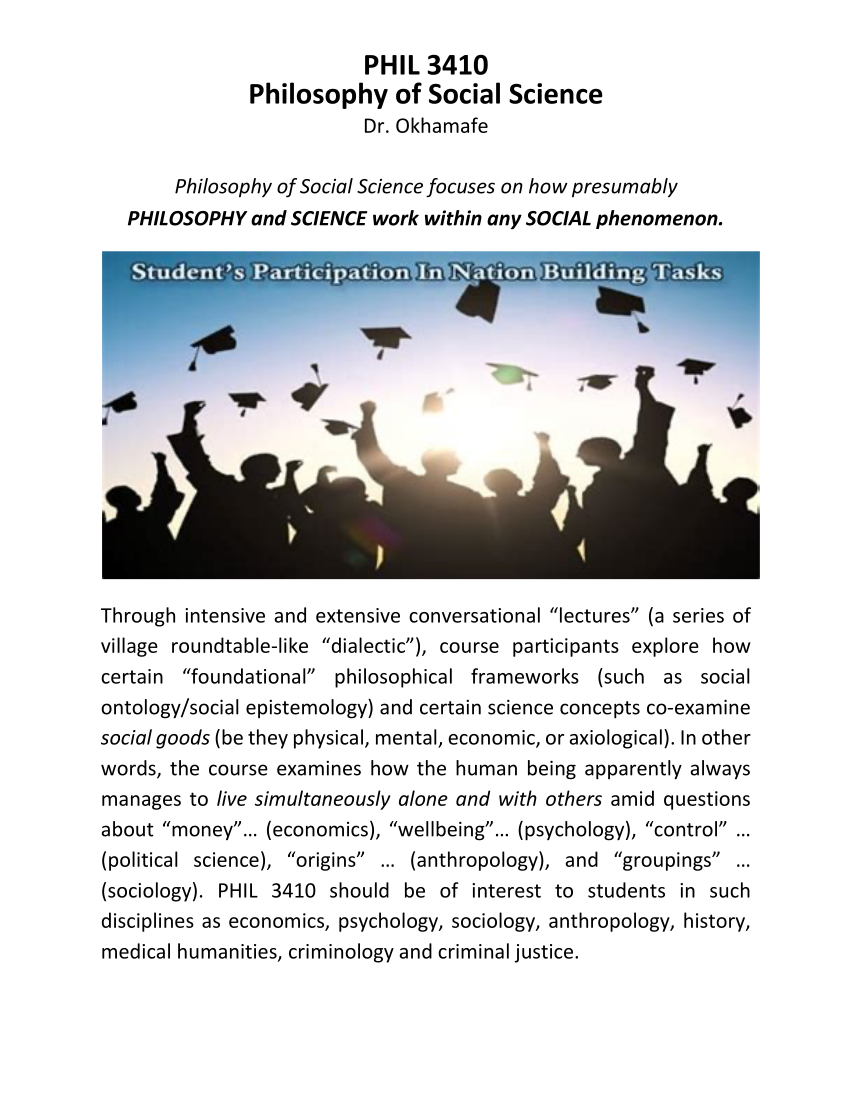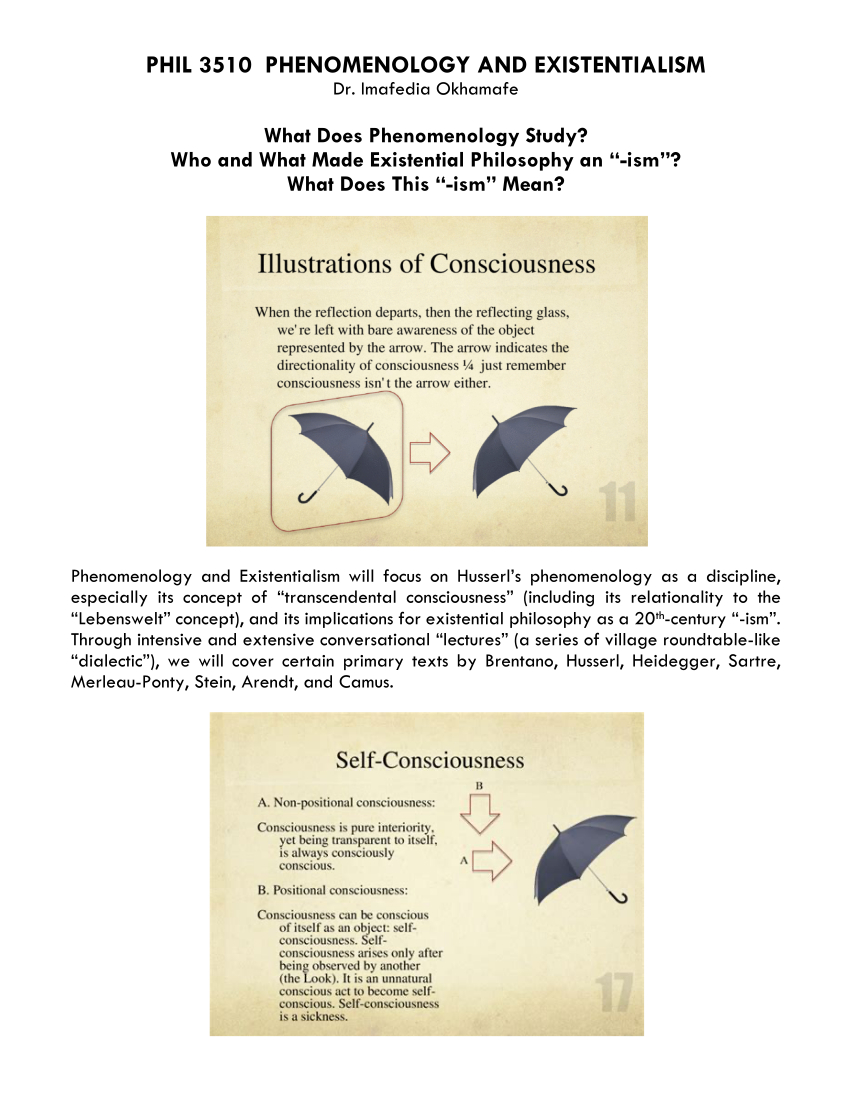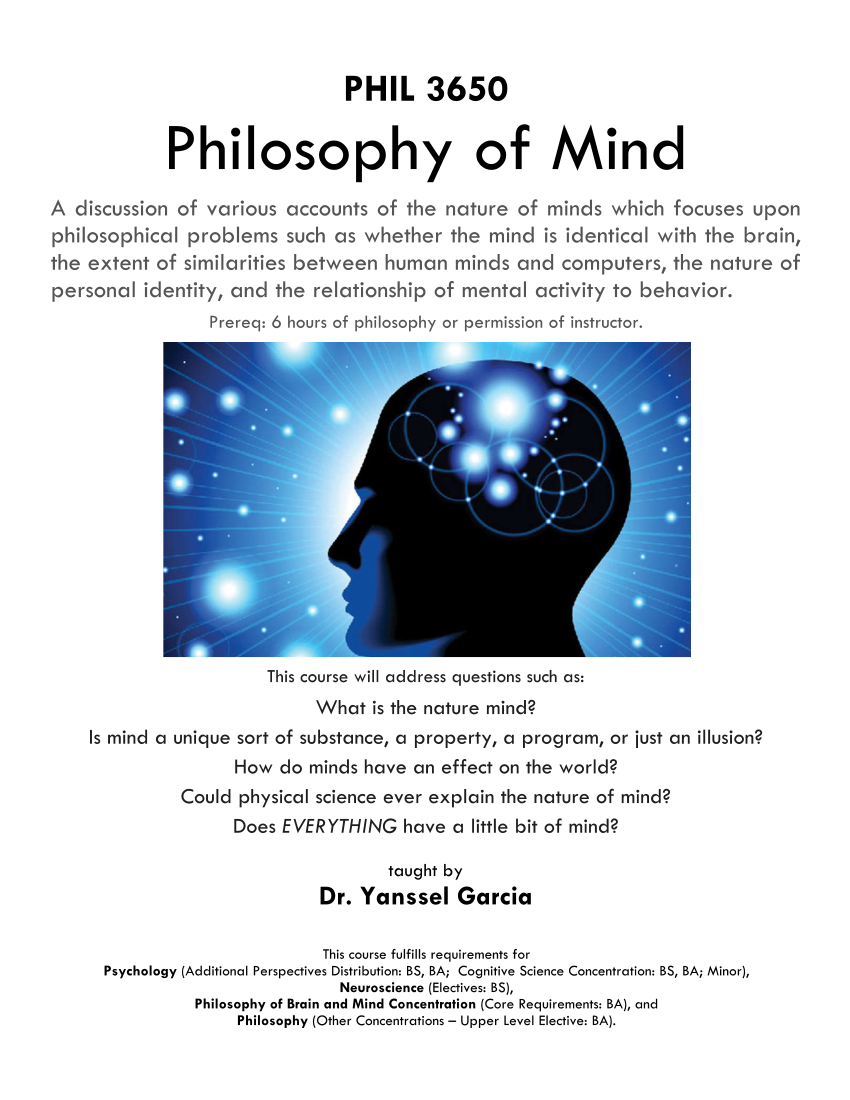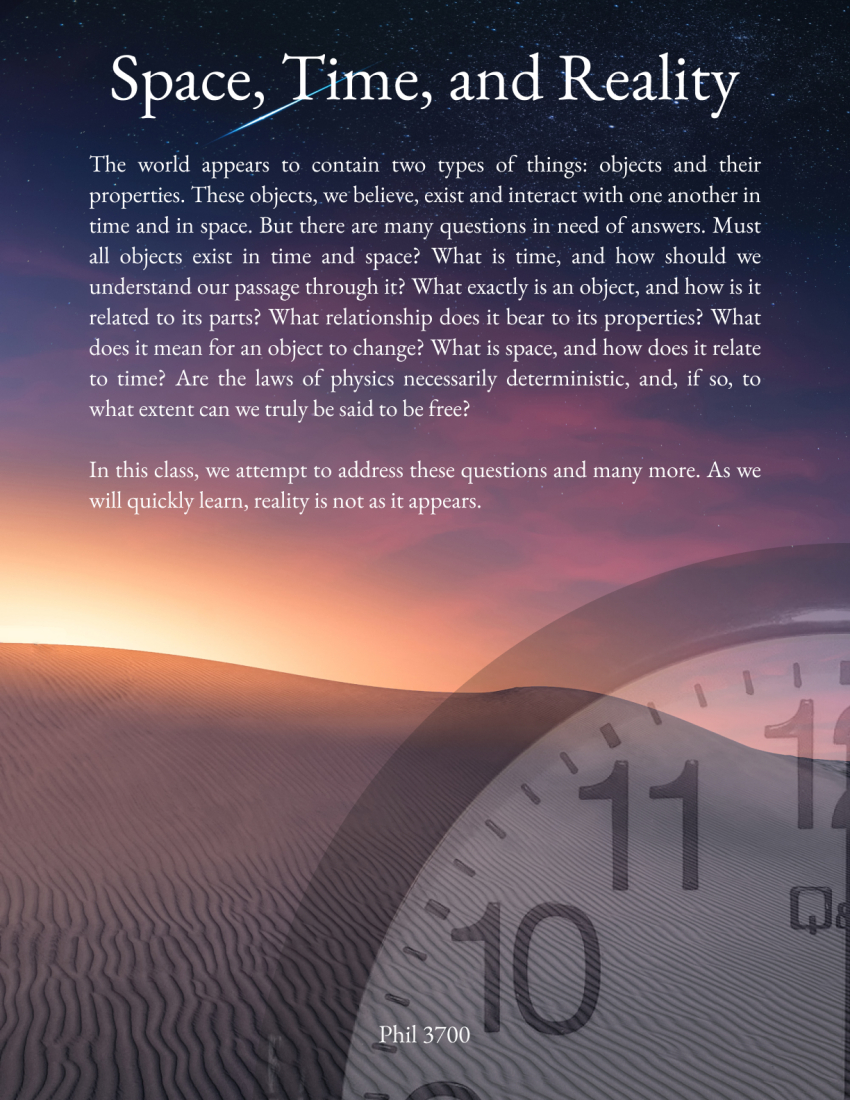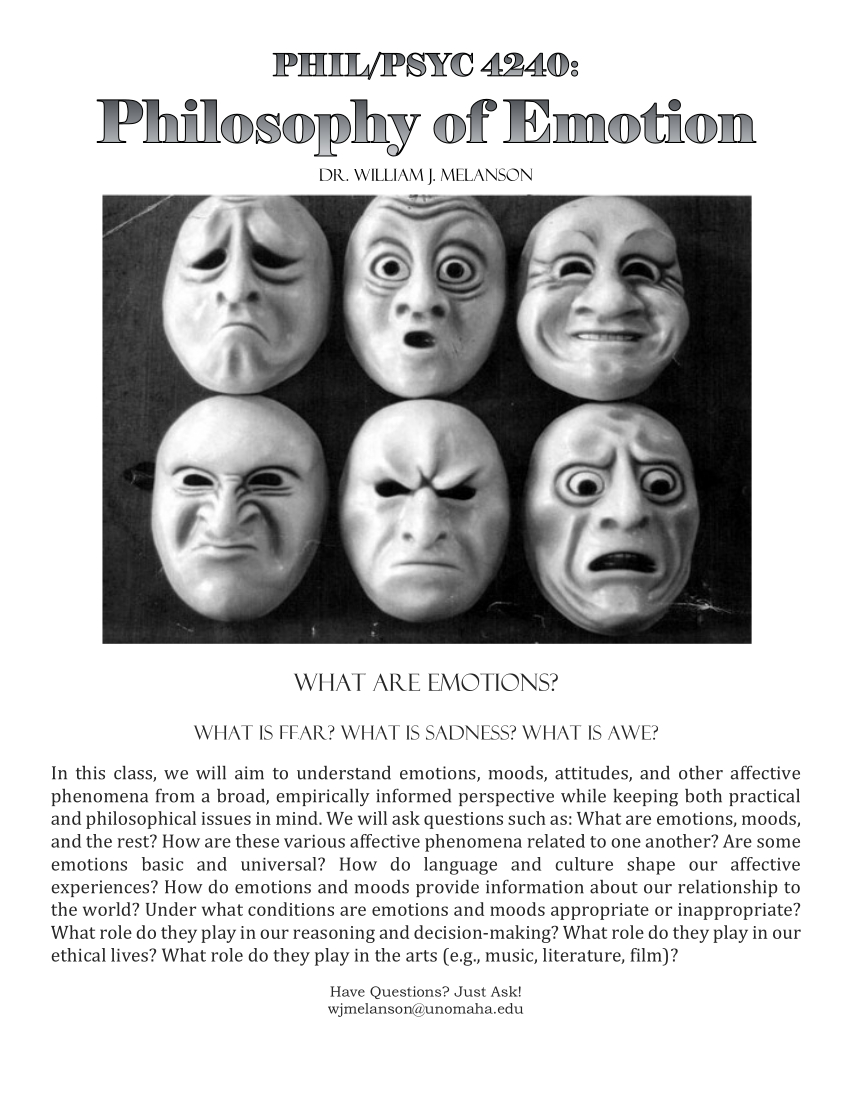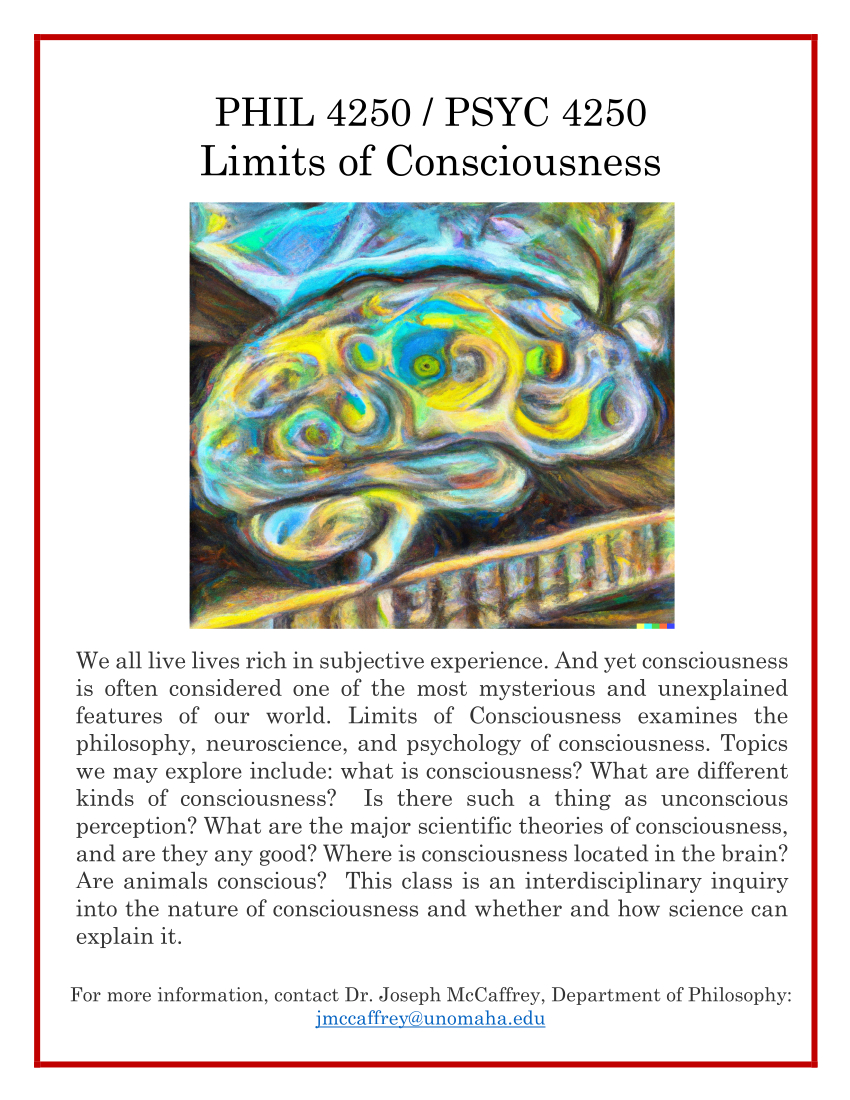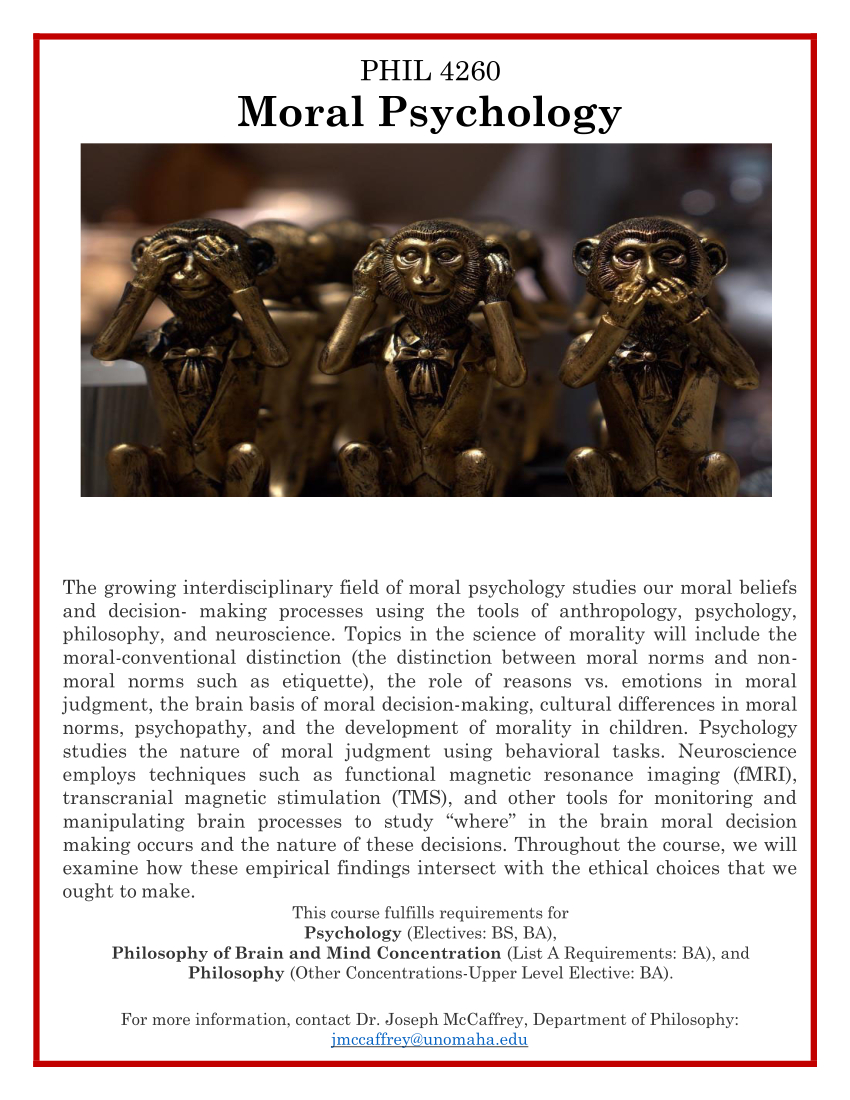Upcoming Spring Courses
Interested in taking philosophy courses this upcoming spring? Below, you'll find the courses we're offering for both the January term and the regular Spring semester. Just as an FYI: click on the posters if you want to see the full image!
J-Session Courses
January 3rd - 20th, 2023

Logical Reasoning for Standardized Graduate Exams
What does it mean to be an engaged critical reasoner? Some think it is simply to be contrarian. This course will challenge that view by emphasizing reasoning activity as systematic and rigorous. This course will include argument construction and assessment, deductive and inductive logics, formal deductive logic, and the identification of fallacies and their avoidance. It will also challenge the students to address real-world issues!
Spring 2023 Courses
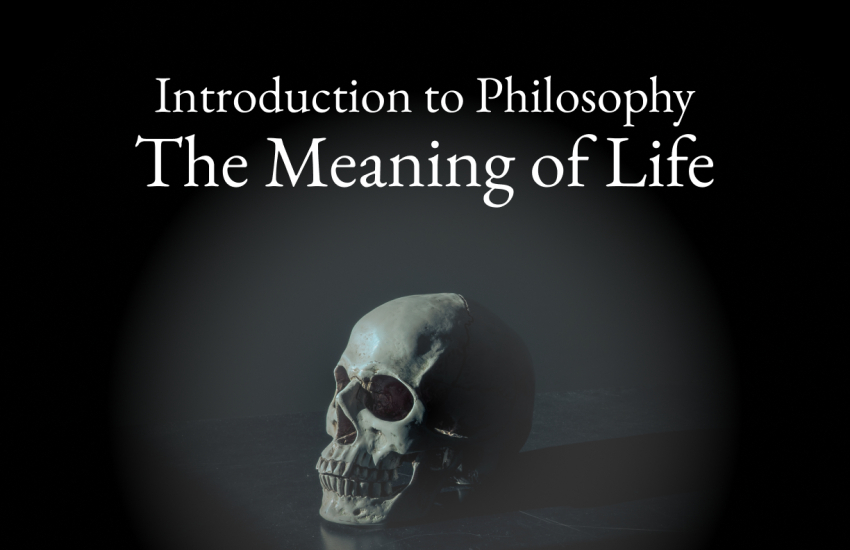
Introduction to Philosophy
The Meaning of Life
What does it mean to live a good life? This course will challenge students to think about why they have come to college, what their next steps are, how a liberal arts education can prepare them for what comes down the road, and what is ultimately meaningful in life.
The course will include philosophical, literary, and psychological examinations of happiness, freedom (how do we make transformative life decisions), the value of college education, materialism/consumerism, and resilience in the face of suffering and mortality.
In short, you will work at answering the fundamental question: What is the meaning of it all?
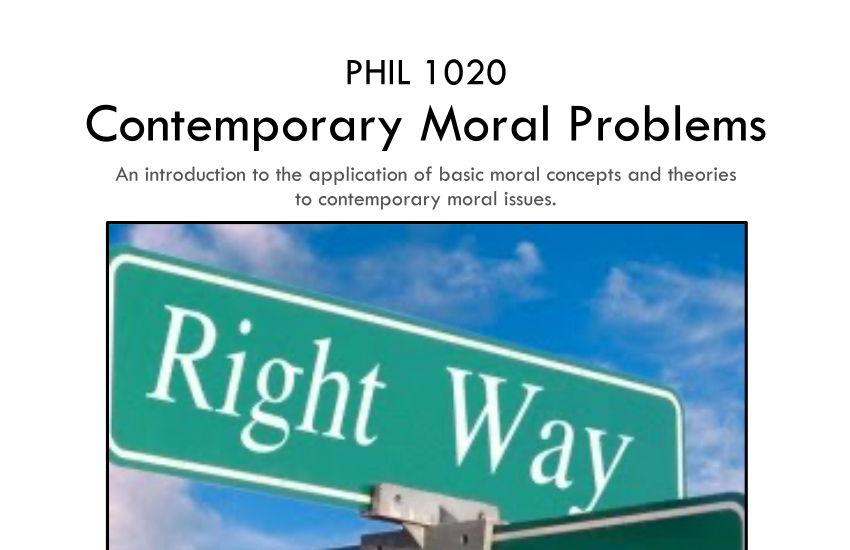
Contemporary Moral Problems
An introduction to the application of basic moral concepts and theories to contemporary moral issues. Discussion topics will vary and may include: distribution of wealth and resources, capital punishment, torture, environmental ethics and sustainability, animal rights, euthanasia, abortion, cloning, genetic engineering, privacy rights, drug laws, marriage and sexuality, gun control, and affirmative action.
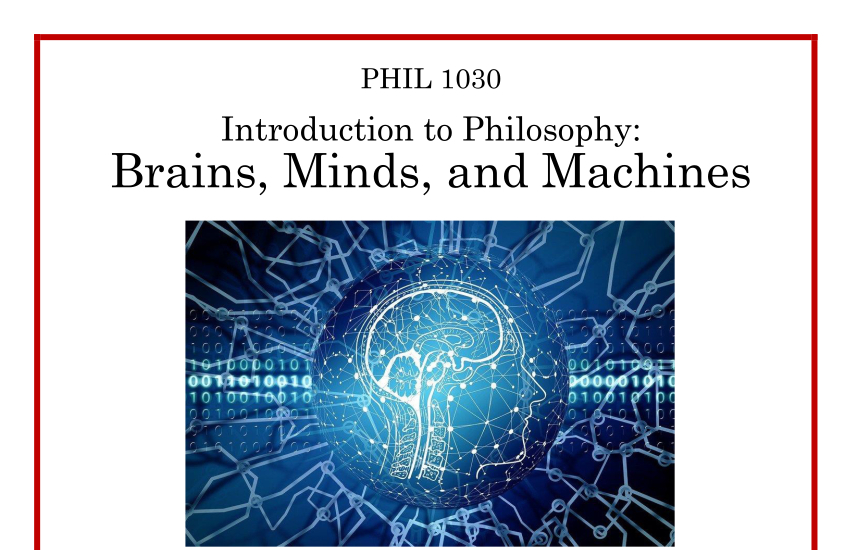
Introduction to Philosophy
Brains, Minds, and Machines
This course examines central questions in philosophy about the nature of the mind, the self, human rationality, perception/experience, and technology through the lens of work in cognitive science, neuroscience, artificial intelligence, and psychology. Some major topics and questions include: What are minds? Is the human mind a digital computer? Could a machine—e.g., a robot or a computer—be truly intelligent, or have experiences like humans and animals do? How does the brain “represent” its environment? In engaging these questions, the course also introduces students to foundational issues in cognitive science and artificial intelligence including: nativism vs. empiricism, mental representation, classical artificial intelligence vs. neural networks, modularity, evolutionary psychology, embodied cognition, and extended cognition.

Introduction to Philosophy
Philosophy, Technology, and Science Fiction
Evil robots! Mad scientists! Alien intelligences! This course introduces core philosophical ideas through a selection of accessible science fiction short stories and films. Does a society's technology determine its values and development? Does technology reflect our values or is it neutral? How do the development of new technologies help and harm people? What is a technological singularity? We will be exploring these questions in the philosophy of technology through how technological advances have been presented in science fiction. In addition, we will also be exploring the philosophical issues around how biological systems could be manipulated. What are the prospects and dangers of biohacking? What are the boundaries of what makes us human? How could different life and ecosystems evolve? Should there be scientific research that shouldn’t be done? Additional topics may include: Could I be deceived about the external world? Do we act freely or is everything predetermined?
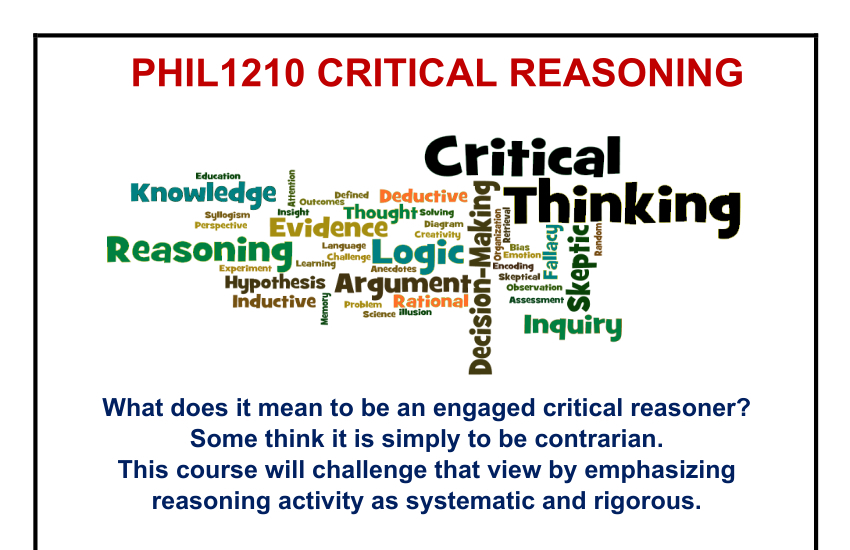
Critical Reasoning
What does it mean to be an engaged critical reasoner? Some think it is simply to be contrarian. This course will challenge that view by emphasizing reasoning activity as systematic and rigorous. This course will include argument construction and assessment, deductive and inductive logics, formal deductive logic, and the identification of fallacies and their avoidance. It will also challenge the students to address real-world issues!
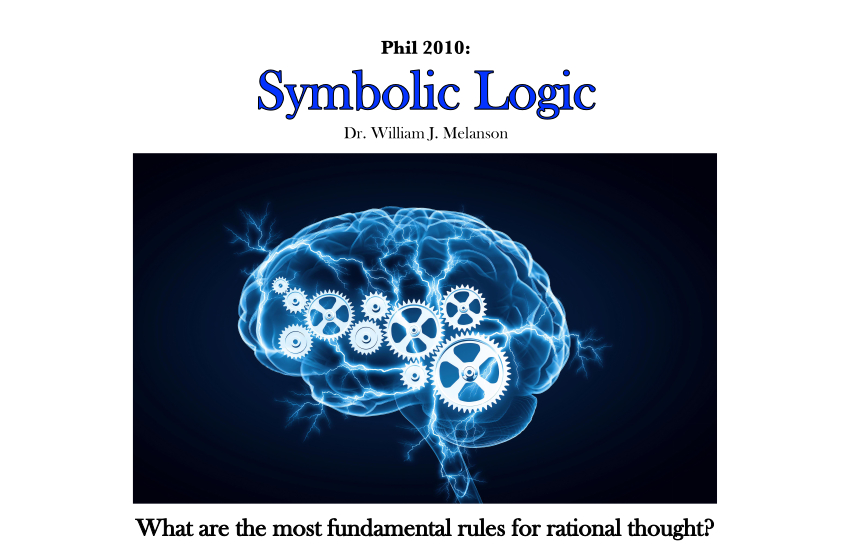
Symbolic Logic
This course covers the central aspects of propositional logic and predicate logic. We study both semantics (i.e., interpretive relations between language and subject matter including notions such as truth and reference) and syntax (i.e., formal relations between elements of language). We learn how to construct and translate formal languages and explore the basis of both semantic and syntactic inference. We also explore foundational issues in logical metatheory. Throughout the course, we discuss broad philosophical themes such as the purpose of language, constraints on translation, and the nature of meaning itself.
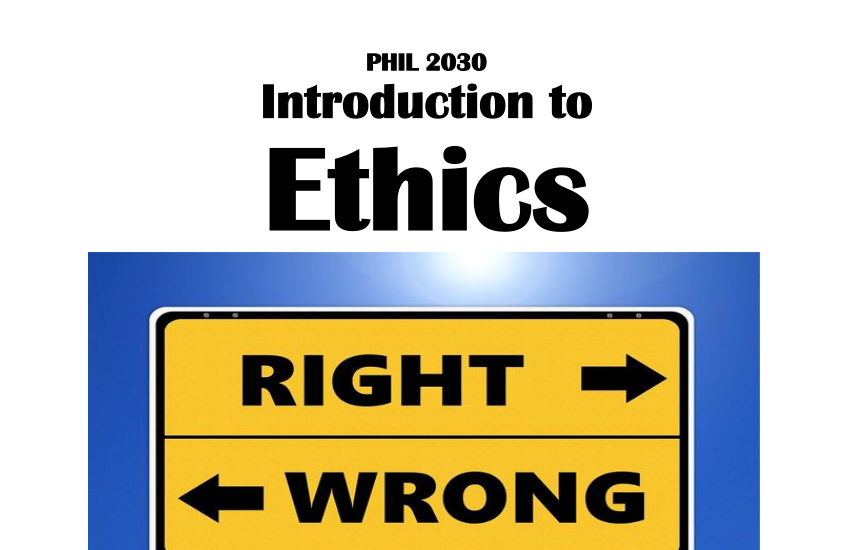
Introduction to Ethics
A critical study of basic moral concepts and problems contained in ethical theories of important western philosophers: relativism, egoism, happiness, obligation, justice, freedom, conscience, love, religious precepts, moral rules, moral attitudes and moral language.
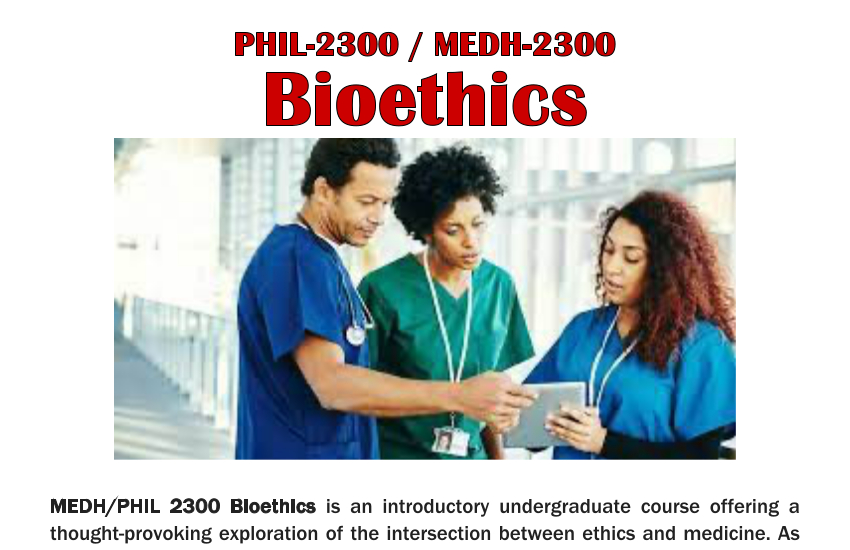
Human Values in Medicine
Medicine, with its constant innovations, is a field where new possibilities continually arise, and with those possibilities come new, meaningful questions. In this course, we will examine the values we apply in making decisions about medical care, as well as case studies from real world clinical practice, to gain a deeper appreciation for the human, ethical aspects of medicine. This course should be of interest to any student preparing for a career in health professions and biomedical research.
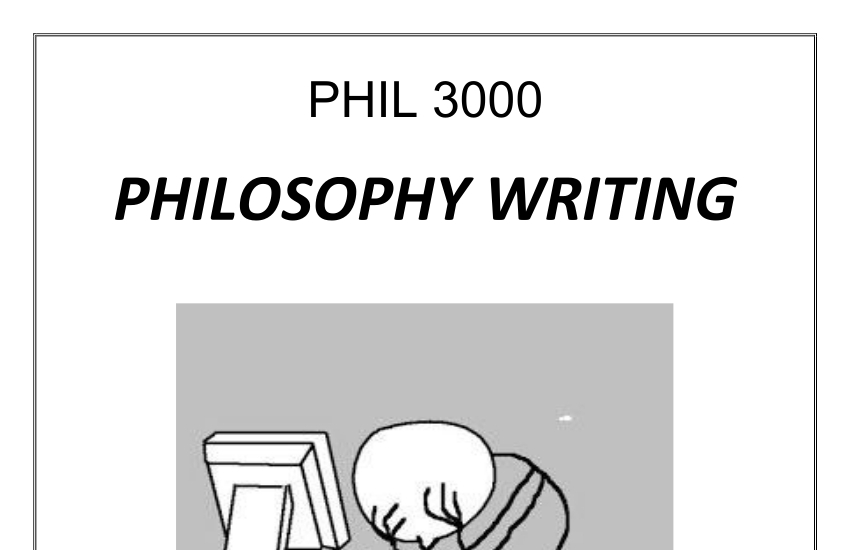
Philosophy Writing
This course focuses on writing instruction, with particular emphasis on editing and revision, the use of logical argument structures, and proper research and citation methods. Significant quantities of both formal and informal writing will be required throughout the semester.
Philosophy Writing is ideally suited to students who are beginning to take upper-level coursework and wish to develop more sophisticated skills in argument-based writing. Although most students who take the course are Philosophy majors or minors, it is open to students from any major, especially those in which logic, mathematics, or other symbolic languages may be used to construct arguments.
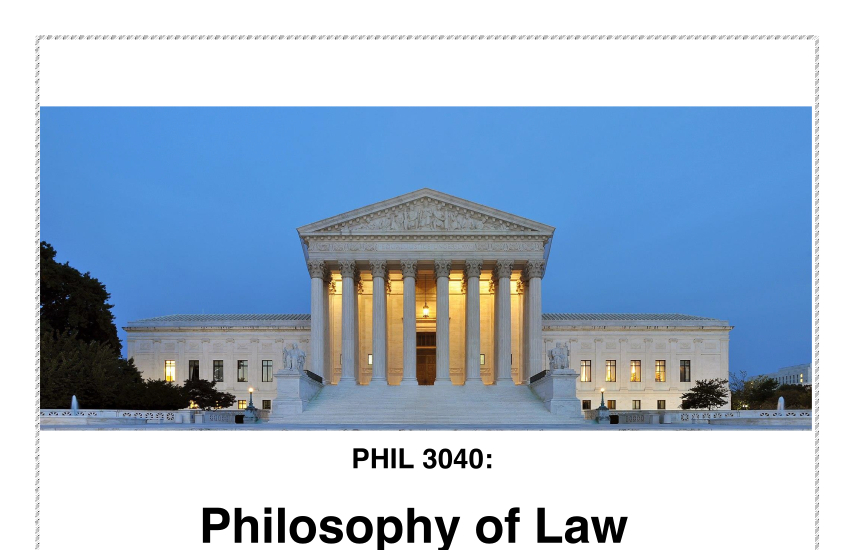
Philosophy of Law
What is the law and how is it created? What makes legal authority legitimate, and what are its limits? What is the relationship between law and morality? What are legal rights and how should they be protected?
This course explores these questions and many others, including competing theories about the nature of the law and legal reasoning, constitutional interpretation, and punishment.
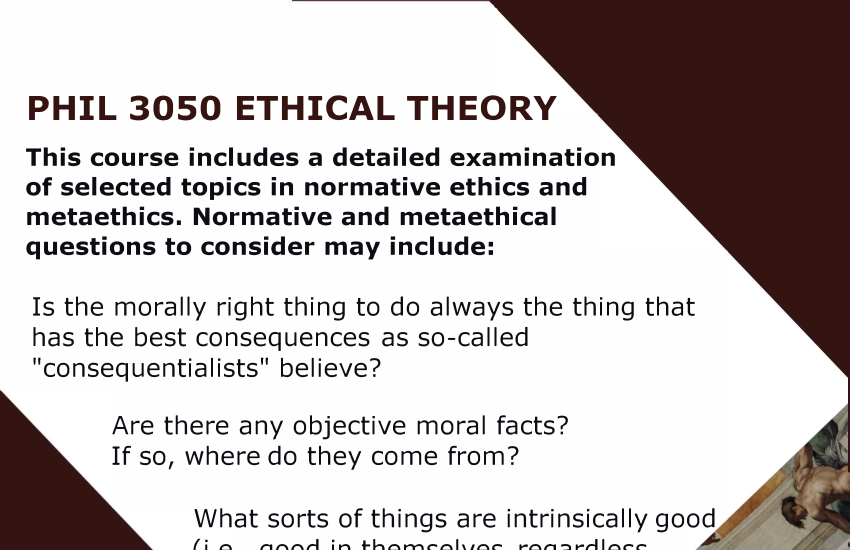
Ethical Theory
This course includes a detailed examination of selected topics in normative ethics and/or metaethics. Normative ethical questions to consider may include: Is the morally right thing to do always the thing that has the best consequences, as so-called "consequentialists" believe? What sorts of things are intrinsically good, i.e., good in themselves, regardless of their effects?
Metaethical questions to be considered may include: Are there any objective moral facts? If so, where do they come from?
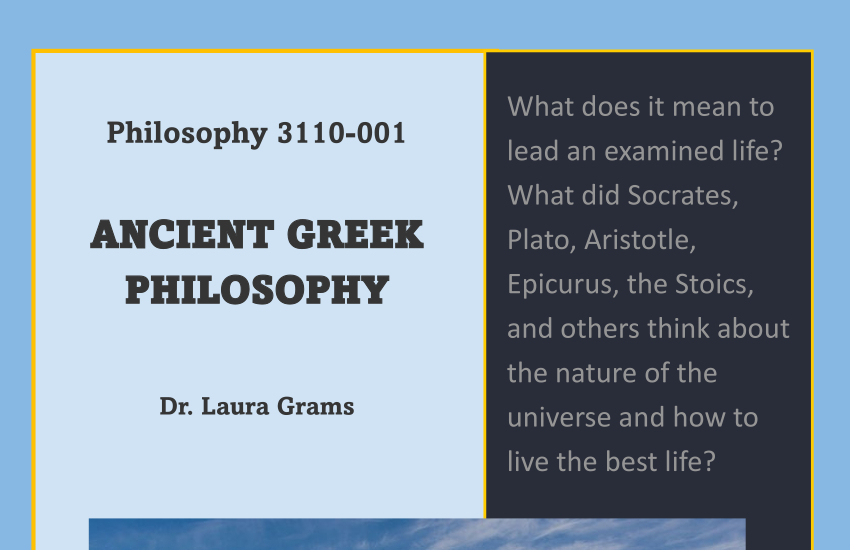
Ancient Greek Philosophy
What does it mean to lead an examined life? What did Socrates, Plato, Aristotle, Epicurus, the Stoics, and others think about the nature of the universe and how to live the best life?
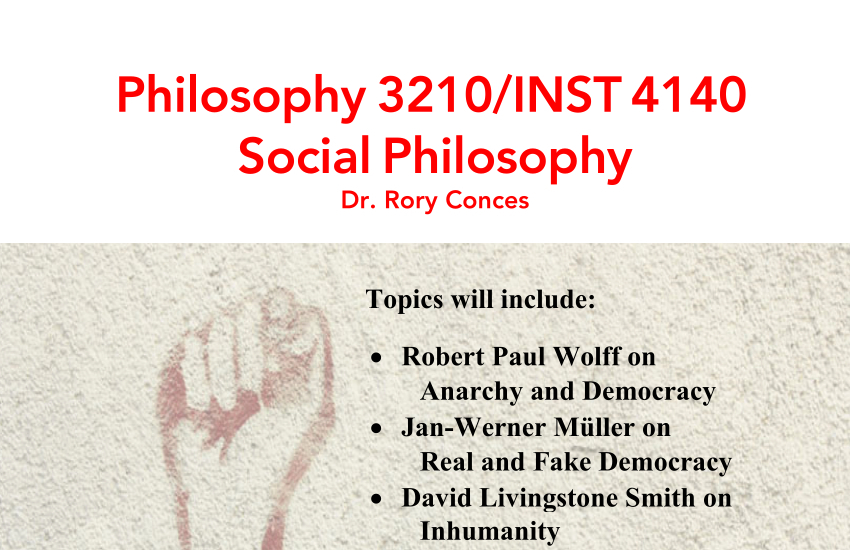
Social Philosophy
Topics will include: Robert Paul Wolff on Anarchy and Democracy; Jan-Werner Müller on Real and Fake Democracy; David Livingstone Smith on Inhumanity; Ethno-Nationalist Conflicts and Democracy and Peace Building; Evocative Objects, Neighborhoods, and Democracy; and many others.
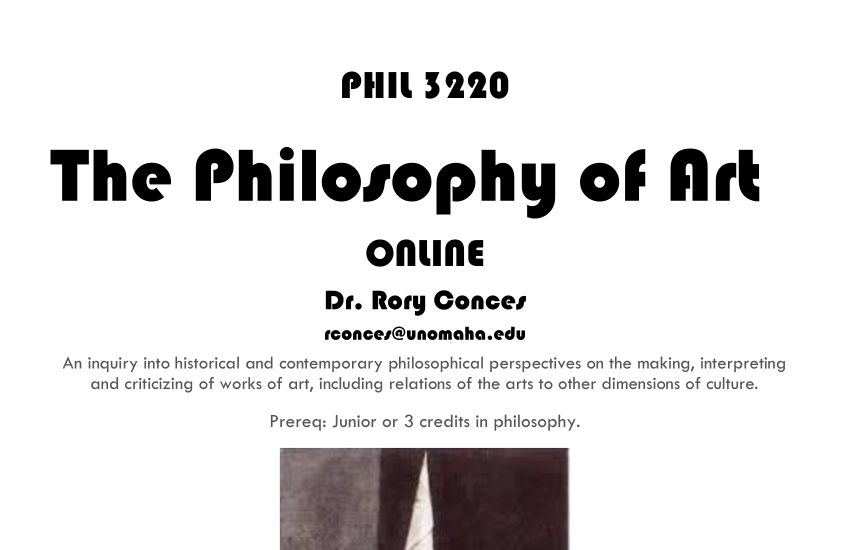
The Philosophy of Art
An inquiry into historical and contemporary philosophical perspectives on the making, interpreting and criticizing of works of art, including relations of the arts to other dimensions of culture. This course will address questions such as "what is a work of art?," "what is beauty?," "can art be immoral?," and "what is the role of art in politics?"
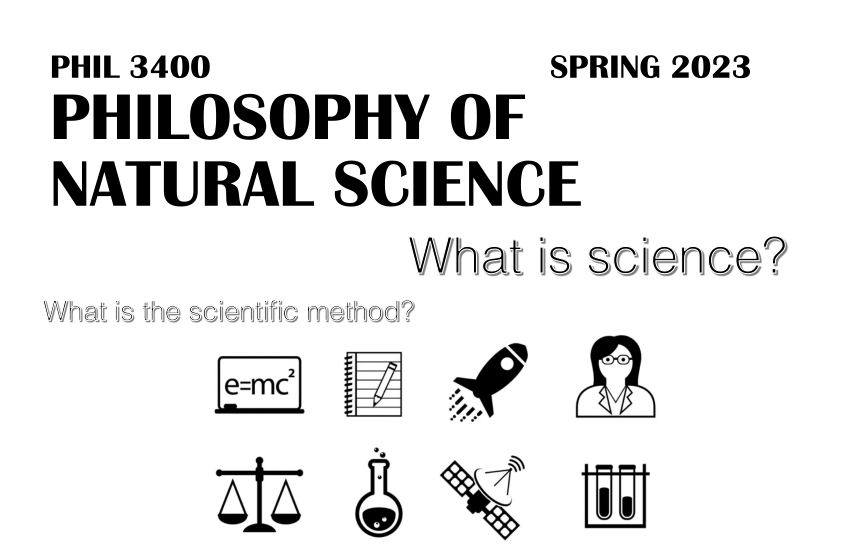
Philosophy of Natural Science
This course will offer an examination of the philosophical problems associated with the methods of the natural sciences, the presuppositions of scientific inquiry, and the nature of scientific laws and theories.
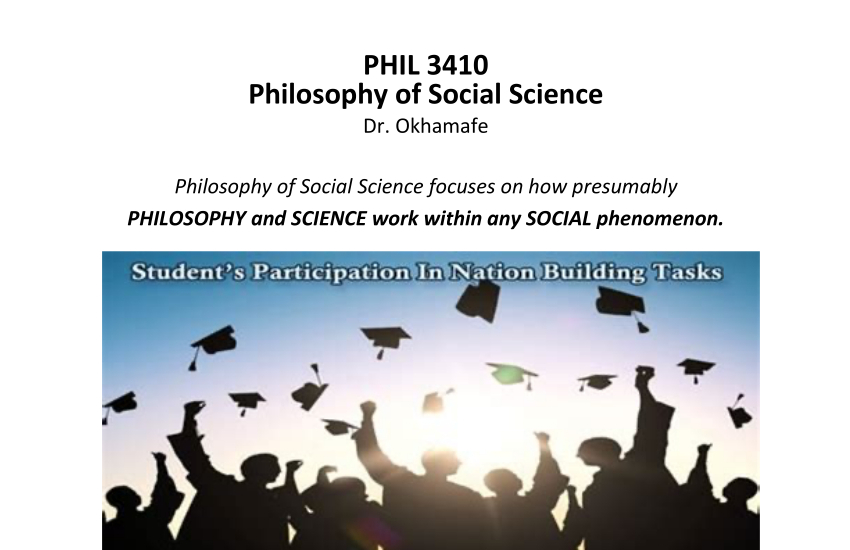
Philosophy of Social Science
Through intensive and extensive conversational “lectures” (a series of village roundtable-like “dialectic”), course participants explore how certain “foundational” philosophical frameworks (such as social ontology/social epistemology) and certain science concepts co-examine social goods(be they physical, mental, economic, or axiological). In other words, the course examines how the human being apparently always manages to live simultaneously alone and with others amid questions about “money”… (economics), “wellbeing”… (psychology), “control” … (political science), “origins” … (anthropology), and “groupings” … (sociology). This course should be of interest to students in such disciplines as economics, psychology, sociology, anthropology, history, medical humanities, criminology and criminal justice.
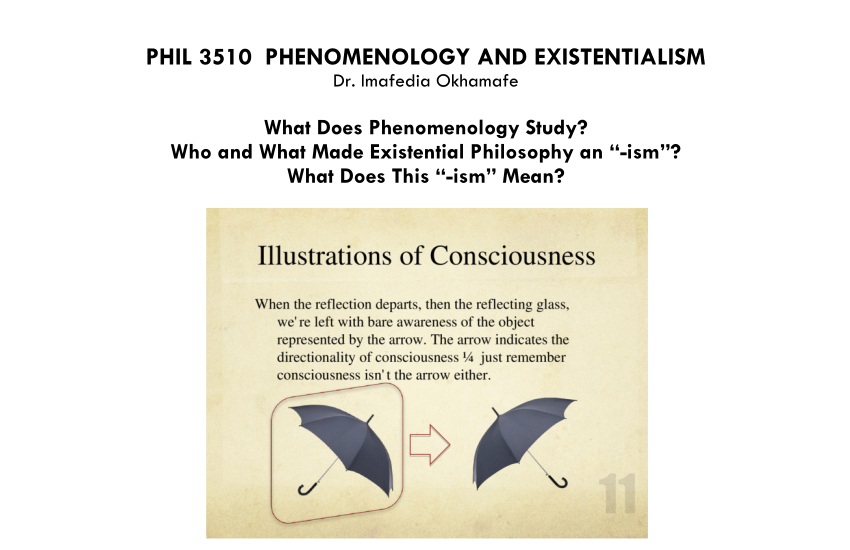
Phenomenology and Existentialism
Phenomenology and Existentialism will focus on Husserl’s phenomenology as a philosophical discipline, especially its twin concept of “transcendental consciousness” and “Lebenswelt”; thereafter, we will examine phenomenology’s implications for or relationships to existential philosophy as primarily a 20th-century global ism (or philosophical phenomenon or movement). Through intensive and extensive conversational “lectures” (a series of village roundtable-like “dialectic”), we will cover certain primary texts by Brentano, Husserl, Heidegger, Sartre, Merleau-Ponty, De Beauvoir, Fanon, Stein, Arendt, and Camus.
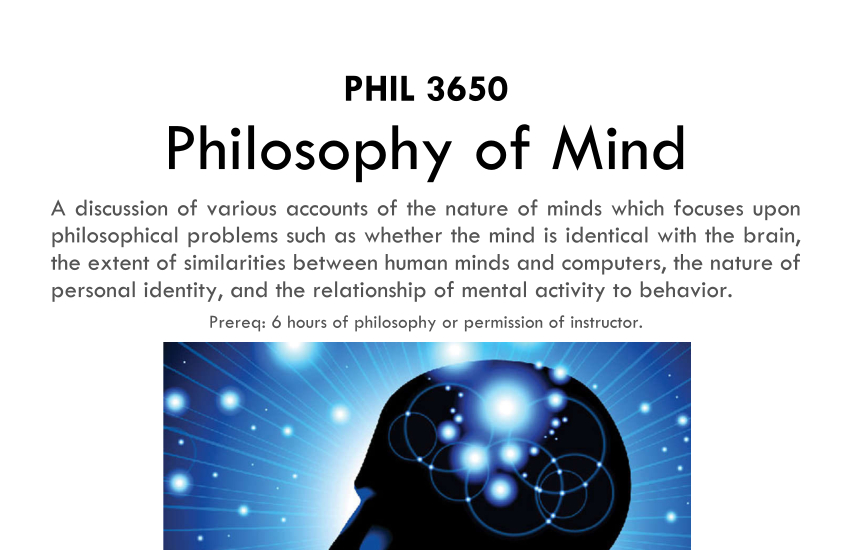
Philosophy of Mind
A discussion of various accounts of the nature of minds which focuses upon philosophical problems such as whether the mind is identical with the brain, the extent of similarities between human minds and computers, the nature of personal identity, and the relationship of mental activity to behavior.
This course will address questions such as: What is the nature mind? Is mind a unique sort of substance, just a program, or nothing at all? Do minds really have an effect on the world? If so, how? Could physical science ever explain the nature of mind? Could mind be somehow a fundamental constituent of reality?
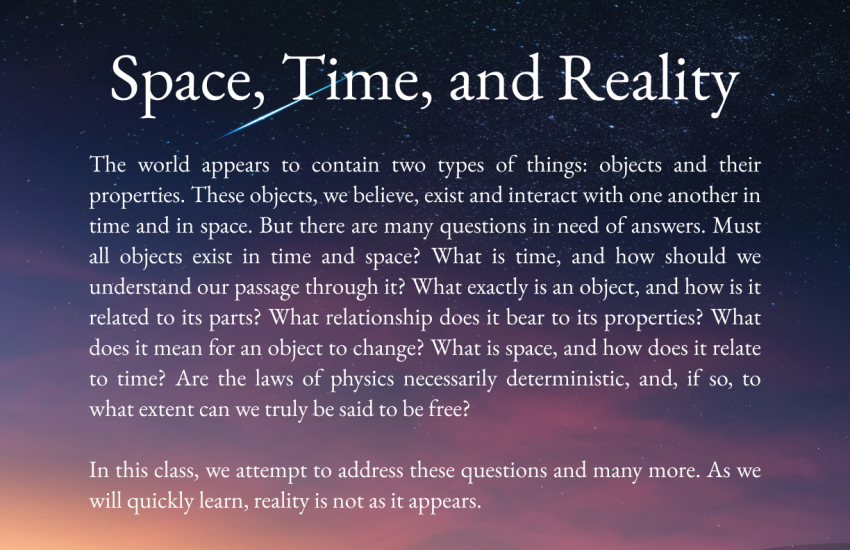
Space, Time, and Reality
The world appears to contain two types of things: objects and their properties. These objects, we believe, exist and interact with one another in time and in space. But there are many questions in need of answers. Must all objects exist in time and space? What is time, and how should we understand our passage through it? What exactly is an object, and how is it related to its parts? What relationship does it bear to its properties? What does it mean for an object to change? What is space, and how does it relate to time? Are the laws of physics necessarily deterministic, and, if so, to what extent can we truly be said to be free?
In this class, we attempt to address these questions and many more. As we will quickly learn, reality is not as it appears.
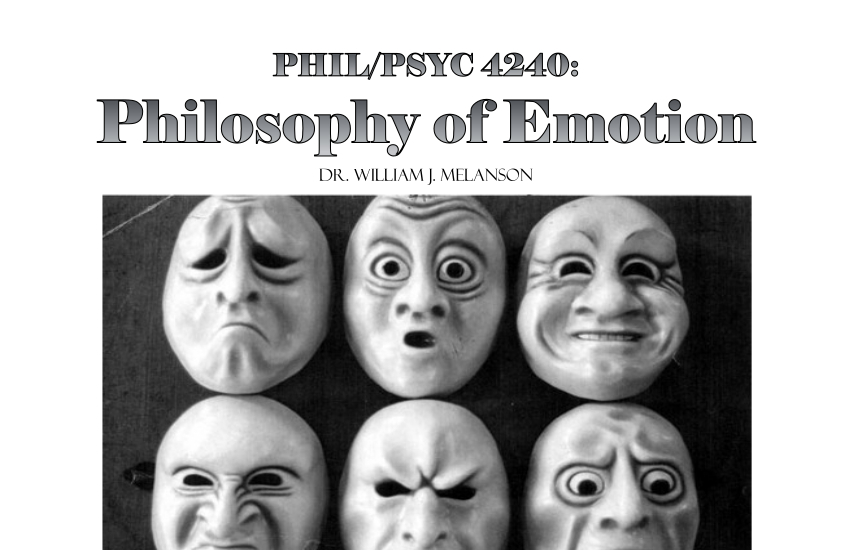
Philosophy of Emotion
In this class, we will aim to understand emotions, moods, attitudes, and other affective phenomena from a broad, empirically informed perspective while keeping both practical and philosophical issues in mind. We will ask questions such as: What are emotions, moods, and the rest? How are these various affective phenomena related to one another? Are some emotions basic and universal? How do language and culture shape our affective experiences? How do emotions and moods provide information about our relationship to the world? Under what conditions are emotions and moods appropriate or inappropriate? What role do they play in our reasoning and decision-making? What role do they play in our ethical lives? What role do they play in the arts (e.g., music, literature, film)?
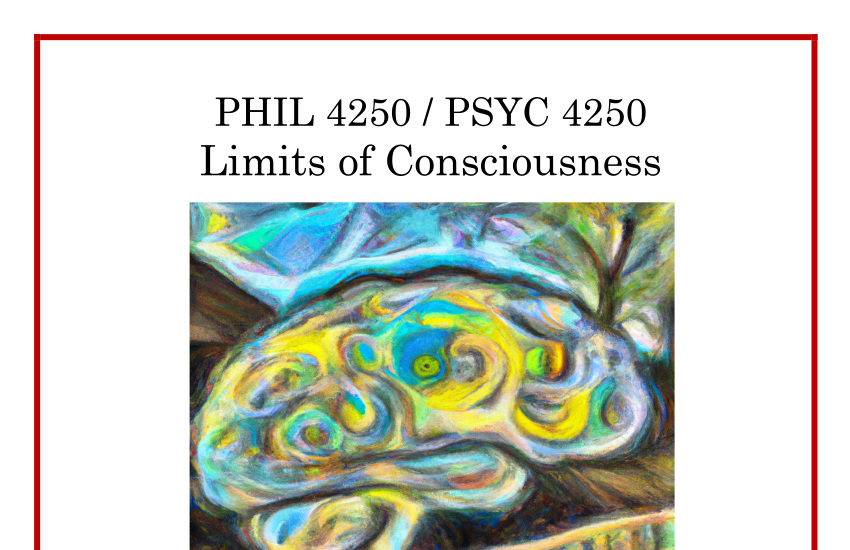
Limits of Consciousness
We all live lives rich in subjective experience. And yet consciousness is often considered one of the most mysterious and unexplained features of our world. Limits of Consciousness examines the philosophy, neuroscience, and psychology of consciousness. Topics we may explore include: what is consciousness? What are different kinds of consciousness? Is there such a thing as unconscious perception? What are the major scientific theories of consciousness, and are they any good? Where is consciousness located in the brain? Are animals conscious? This class is an interdisciplinary inquiry into the nature of consciousness and whether and how science can explain it.
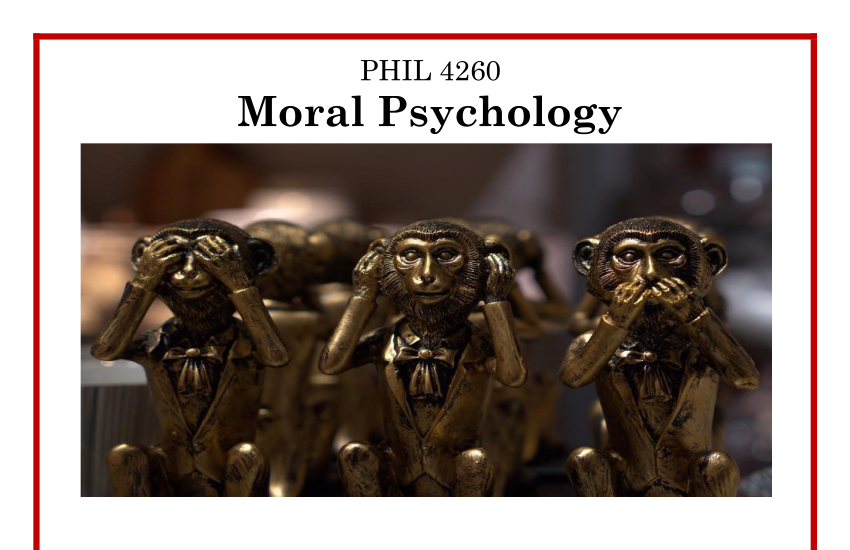
Moral Psychology
The growing interdisciplinary field of moral psychology studies our moral beliefs and decision- making processes using the tools of anthropology, psychology, philosophy, and neuroscience. Topics in the science of morality will include the moral-conventional distinction (the distinction between moral norms and non-moral norms such as etiquette), the role of reasons vs. emotions in moral judgment, the brain basis of moral decision-making, cultural differences in moral norms, psychopathy, and the development of morality in children. Psychology studies the nature of moral judgment using behavioral tasks. Neuroscience employs techniques such as functional magnetic resonance imaging (fMRI), transcranial magnetic stimulation (TMS), and other tools for monitoring and manipulating brain processes to study “where” in the brain moral decision making occurs and the nature of these decisions. Throughout the course, we will examine how these empirical findings intersect with the ethical choices that we ought to make.
